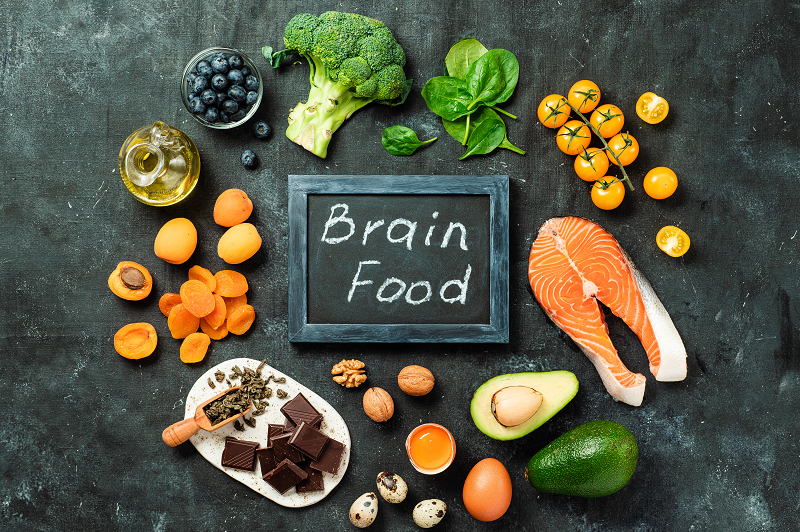
The effect of nutrition on memory is directly related to cognitive functions. Nutrition has a significant impact on mental performance, focus, and learning processes.
Nutrition is a key factor that affects brain health. A regular, balanced diet can support cognitive functions. In particular, understanding the positive effects of certain nutrients on memory is important for a healthy mental life.
The brain is an organ that constantly needs energy, and getting the right nutrients plays a key role in providing this energy. Food intake has a special place in the process of strengthening memory.
Foods Rich in Memory-Boosting Nutrients
Foods rich in memory-boosting nutrients contain special nutrients that support brain health and enhance cognitive function. Regular consumption of a variety of foods that contain these memory-boosting nutrients is important for protecting brain health and increasing memory function. In our blog post, “15 Superfoods for the Brain and Nervous System,” you can read in detail about which foods are in question and what their function is for the brain and nervous system.
Omega-3 Fatty Acids and Brain Health
Foods rich in omega-3 fatty acids, such as fish, walnuts, and chia seeds, can increase memory function by supporting the structure of nerve cells.
Antioxidants: protecting brain cells
Antioxidants found in fruits and vegetables protect brain cells by fighting free radicals and may prevent cognitive decline.
Vitamins essential for improving memory
Some vitamins such as Vitamins B, C, D and E play an important role in improving memory and supporting cognitive function. Getting these vitamins in sufficient amounts is possible with a healthy diet, balanced diet and supplements.
The role of vitamin E in cognitive function
Vitamin E is important for brain health. It can protect brain cells with its antioxidant properties, especially during the aging process and when the risk of neurodegenerative diseases increases. In addition to its antioxidant effects, vitamin E may also affect cognitive function. Reducing oxidative stress in the brain may support memory and learning abilities. Some research suggests that vitamin E supplementation may reduce the development of neurodegenerative diseases such as Alzheimer’s disease. In short, vitamin E may support brain health and have a positive effect on cognitive function.
B vitamins and memory retention
B vitamins, especially B6, B9 (folic acid), and B12, play an important role in maintaining healthy memory and cognitive function. B6 (pyridoxine) is critical for nervous system function. B9 (folic acid) is important for brain development and cell division. B12 (cobalamin) is critical for nervous system health and protection of the myelin sheath. The effects of B vitamins on memory are related to their contribution to processes such as the production of neurotransmitters, communication between nerve cells, and cell division.
Memory-Enhancing Minerals
Memory-enhancing minerals are important nutrients that support cognitive function and have positive effects on memory. Zinc and magnesium are among them. A balanced intake of these minerals is possible with a healthy diet. A varied and balanced diet is important for preserving and improving memory and cognitive function.
The importance of zinc for cognitive clarity
Zinc is an important mineral for cognitive clarity and general nervous system function. It is necessary for the normal function of nerve cells. This mineral plays a role in the processes of nerve conduction and the production of neurotransmitters. Zinc deficiency can cause impaired cognitive function and difficulty concentrating. Zinc can have positive effects, especially on attention, memory and learning. It has antioxidant properties and protects cells from oxidative stress.
The impact of magnesium on nervous activity
Magnesium has a significant impact on nervous activity and is a mineral that regulates the functions of the nervous system. It can have an effect on the membrane potential of nerve cells. This means regulating nerve conduction and controlling the excitability of nerve cells.
Herbs and Spices: Natural Memory Enhancers
Some herbs and spices such as turmeric and rosemary may support brain health and have memory-enhancing effects due to the antioxidants, vitamins, and minerals they contain.
Turmeric and its active ingredient curcumin
Turmeric is a spice derived from the roots of Curcuma longa, a plant in the ginger family and an herbal supplement known for its health benefits. Curcumin, the active ingredient in turmeric, is the compound that gives the plant its yellow color and has various positive health effects. New research shows that curcumin may enhance cognitive function and have neuroprotective effects.
The impact of rosemary on memory
Rosemary (Rosmarinus officinalis) is an herb that has been traditionally used as a spice and is particularly common in Mediterranean cuisine. Additionally, some research on the potential health benefits of rosemary suggests that it may have positive effects, especially on memory. It may have a stimulating effect due to the essential oils and antioxidants it contains. This stimulating effect may increase mental alertness and support cognitive performance.
Hydration: The Role of Water in Cognitive Function
Hydration has a significant impact on cognitive function. Water plays a key role in the proper functioning of a number of essential processes in the body, and one of these processes is cognitive function. Water in the body plays an important role in the formation of various body fluids, including cerebrospinal fluid.




I like your content. Information